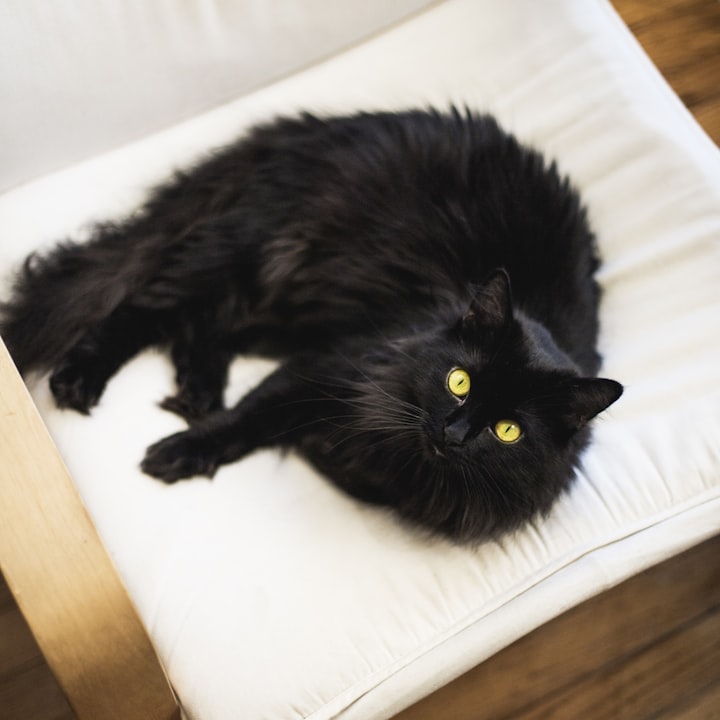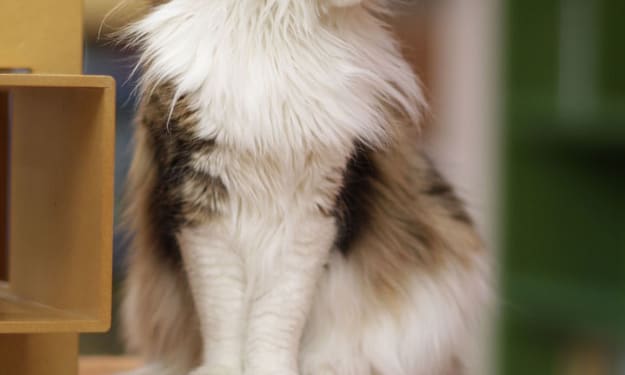October, Is Black Cat Awareness Month
They Are Not Evil so Let's Keep Them Safe
As an animal lover and advocate for black cats, I am here today to draw attention to keeping our furry friends safe. October is black cat awareness month, and I would like people to be mindful of these little guys as Halloween draws closer. The black cat has long been the center of many myths and superstitions portraying them as evil creatures. Unfortunately, these ideas place them in danger of brutalization and ritualistic sacrifices. Even in modern times, the risk potential is a threat to these animals, so I am hoping today I can debunk some of the myths that still follow the black cat making people more aware.
Black cats are at the bottom of the totem pole when adoptions are considered opposed to cats of any other color. Although pet agencies encourage adopting a black cat, you may find the task challenging in October. In addition, some shelters will not allow the adoption of black dogs or cats during the Halloween season, fearing abuse or worse. Sadly, some people obtain our dark-coated friend as an accessory or prop for a costume or spooky event and dump them afterward as if they are merely trash.
When and Where Did the Superstitions begin?
My research takes me back to the medieval ages of Europe and the outbreak of the bubonic plague, also known as the Black Death. From 1347 to 1352, an estimated 25 million people perished from an illness without any scientific understanding. Perhaps it was easier for people without answers to blame the black cat because of its mysterious nature, spooky appearance, and glowing eyes. However, mass hysteria placed the cats in harm’s way, destroying thousands to wipe out pestilence. Indeed, rats were the actual disease carriers, and cat disposal did not vanquish the plague.
During the middle ages, the belief arose that the devil ascended as a black cat. The Catholic Church accused Heretical groups of associating with and worshipping cats. Some of these ideas probably derive from the fact that cats are independent by nature. Medieval people believed that animals were created and put on earth to serve humans remaining under their rule. Since training a cat did not receive the same results as training a dog, lacking obedience and loyalty, the notion became apparent that cats, especially black ones, were wild and free-spirited.
The stigma attached to black cats spread like wildfire from early 13th century Europe to 17th century Salem, Massachusetts. Black cats, supposedly, were witches in disguise or demons in animal formation sent by witches to spy on humans. Many cats were executed alongside those suspected of witchcraft.
One of the earliest folklores (generations of stories passed by word of mouth) tells the tale of a man and his son walking down a street when they spotted a black cat in their path. The pair picked up rocks, pelting them at the animal until the injured feline scampered away into the home of a woman known for practicing witchcraft. The next day, the woman emerged from her home, walking with an obvious limp presumed as the cat of the previous day.
Another idea during the middle ages pertained to lonely women; if a lonely woman fed stray cats, she must be a witch, and the cat was her companion in black magic arts.
Perhaps the strangest folklore I have come across speaks about cats snuffing the life out of infants. The idea is that a black cat may climb into a baby’s crib and suffocate the child by placing its nose against the infant’s mouth, sucking the breath out of the baby. The motivation has a couple of factors, jealousy and the cat seeks the milk on the infant’s lips. An older theory suggests the cat aims to suck the soul out of a sleeping newborn.
Not All Associations with Black Cats Are Evil!
The ancient Egyptians worshipped a goddess named Bastet. Depicted as black, Bastet was the “goddess of protection and cats.” The Egyptians held Black cats in the highest esteem as magical symbols of good luck. Homeowners treated their cats like royalty, dressing them in jewels and feeding them well, even mummifying them and laying to rest with royals after their death. Injuring or killing a black cat was considered a capital crime in ancient Egypt. Punishments were severe, sometimes resulting in the execution of the perpetrator.
In the 8th century, sailors and fishermen kept black cats aboard as sailing companions. In addition to warding off annoying rats, the cats kept seamen company as good luck symbols. Fishermen often predicted the weather by the cat’s behavior, and their wives at home kept black cats as pets believing their presence assured the husband’s safe return home after a long journey at sea.
In South France, black cats have been called Matagot, also known as magician cats or money cats. The belief is if treated with respect, given a good place to sleep, and maybe the first bite of dinner, then matagot will reward their owner with wealth and prosperity. Also, in France, peasants have long believed in following any black cat dropped off at a crossroads where five roads meet. Supposedly, following the cat brings one to their fortune.
In Japan, black cats are a symbol of luck, especially for single women. Having one as a pet is esteemed for attracting a suitable admirer. Unlike much of the western world, people in Japan see a black cat crossing your path as a positive omen.
Fengshui speaks highly of black cats stating that black cats possess strong powers of good, drawing them to harmony. A happy cat is a sign of a harmonious home. By keeping your black cat happy and safe, he will ensure the same generosity for you.
Finding a stray black cat on your doorstep in Scotland foretells prosperity.
In midland England, people believe that gifting a wedding couple a black cat will bring good luck to the bride. English superstition states that newlyweds with a black cat in their household will have a long prosperous life together with the feline warding off evil.
The most interesting positive folklore I discovered about black cats pertains to the theatre. Apparently, black cats make great audience members, and if one happens to make its way into an assembly during the opening night of a production, then the actors shall expect a long prosperous run of their show.
Debunking the Myths
As you can see, there are plenty of contrasting superstitions regarding the black cat, much of which comes from fear-based notions of the past. However, modern-day embraces the nature-based practice of witchcraft, and as someone who has known many a witch, I can assure you none of them ever transitioned into any creature, including a black cat!
I grew up in a superstitious European household and can understand fear and hesitancy. I, too, heard the stories about the forbearers of bad luck and the sort during my upbringing. However, my British roots never supported the notion of a black cat being the symbol of evil. My first cat, Phadra, was a sweet black kitty that slept with my eldest daughter after her birth. She always slept in the corner of the crib or at my daughter’s feet. Not once did Phadra attempt to suffocate my child. Instead, my kitty was the perfect alarm clock, waking me minutes before my daughter’s bottle feeding time every morning.
I think the most important thing here, for all to keep in mind, is that no matter what one personally believes about the myths of black cats, they are innocent animals when it all comes down to it. For anyone consumed with superstition, keep in mind that neither the positive or negative superstitions can realistically be proven. Perhaps taking a moment to look at the black cat as a simple warm creature worthy of love and affection is worth more attention than folklores of the past lacking credibility.
.
About the Creator
Marilyn Glover
7x Medium boosted poet, editor, and Reiki Master who is at her best when in nature. Creating to boost humanity while often not coloring within the lines. Follow me at: https://gmarilyn009.medium.com/







Comments
There are no comments for this story
Be the first to respond and start the conversation.